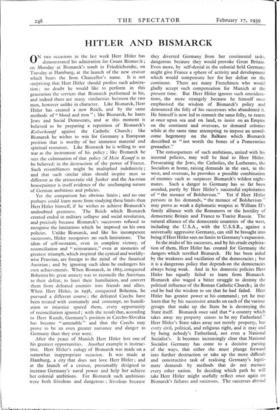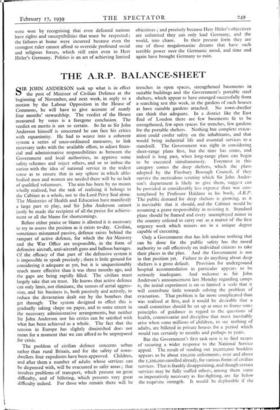HITLER AND BISMARCK
ON two occasions in the last week Herr Hitler has demonstrated his admiration for Count Bismarck ; on Monday at Bismarck's tomb in Friedrichsruhe, on Tuesday at Hamburg, at the launch of the new cruiser which bears the Iron Chancellor's name. It is not surprising that Herr Hitler should profess such admira- tion ; no doubt he would like to perform in this generation the services that Bismarck performed in his, and indeed there are many similarities between the two men, however unlike in character. Like Bismarck, Herr Hitler has created a new Reich, and by the same methods of " blood and iron " ; like Bismarck, he hates Jews and Social Democrats, and at this moment is believed to be preparing a repetition of Bismarck's Kulturkampf against the Catholic Church; like Bismarck he wishes to win for Germany a European position that is worthy of her immense material and spiritual resources. Like Bismarck he is willing to use war as the instrument of his policy ; like Bismarck he sees the culmination of that policy (if Mein Kampf is to be believed) in the destruction of the power of France. Such resemblances might be multiplied indefinitely ; and that such similar ideas should inspire men so different as the aristocratic old Junker and the Austrian housepainter is itself evidence of the unchanging nature of German ambitions and policies.
Yet the comparison has obvious limits ; and no one perhaps could learn more from studying these limits than Herr Hitler himself, if he wishes to achieve Bismarck's undoubted greatness. The Reich which Bismarck created ended in military collapse and social revolution, and precisely because Bismarck's successors refused to recognise the limitations which he imposed on his own policies. Unlike Bismarck, and like his incompetent successors, Hitler recognises no such limitations. The ideas of self-restraint, even in complete victory, of reconciliation and " reinsurance," even at moments of greatest triumph, which inspired the cynical and worldly- wise Prussian, are foreign to the mind of the fanatical Austrian ; and by ignoring such ideas he endangers his own achievements. When Bismarck, in 1865, conquered Bohemia his great anxiety was to reconcile the Austrians to their defeat, to limit their humiliation, and convert them from defeated enemies into friends and allies. When Herr Hitler, in 1938, conquered Bohemia, he pursued a different course ; the defeated Czechs have been treated with contumely and contempt, no humili- ation or injustice spared them, every opportunity of reconciliation ignored ; with the result that, according to Herr Kundt, Germany's position in Czecho-Slovakia has become " untenable " and that the Czechs may prove to be an even greater nuisance and danger to Germany than they ever were.
After the peace of Munich Herr Hitler lost one of his greatest opportunities. Another example is instruc- tive. Herr Hitler's eulogy of Bismarck was made on a somewhat inappropriate occasion. It was made at Hamburg, a city that does not love Herr Hitler ; and at the launch of a cruiser, presumably designed to increase Germany's naval power and help her achieve her colonial ambitions. For Bismarck such ambitions were both frivolous and dangerous ; frivolous because they diverted Germany from her continental tasks, dangerous because they would provoke Great Britain. Even more, by self-denial in the colonial field Germany might give France a sphere of activity and development which would compensate her for her defeat on the continent. There are many Frenchmen who would gladly accept such compensation for Munich at the present time. But Herr Hitler ignores such considera- tions, the more strangely because he himself once emphasised the wisdom of Bismarck's policy and denounced the folly of his successors who abandoned it. He himself is now led to commit the same folly, to rearm at once upon sea and on land, to insist on an Empire on the continent and overseas, to demand colonies while at the same time attempting to impose an unwel- come hegemony on the Balkans which Bismarck described as " not worth the bones of a Pomeranian grenadier."
The consequences of such ambitions, united with his internal policies, may well be fatal to Herr Hitler. Persecuting the Jews, the Catholics, the Lutherans, the Socialists at home, raising demands in the east, in the west, and overseas, he provokes a possible combination of enemies such as surpasses Bismarck's wildest night- mares. Such a danger to Germany has so far been avoided, partly by Herr Hitler's successful exploitation of " the menace of Bolshevism." Yet if Herr Hitler persists in his demands, " the menace of Bolshevism " may prove as weak a diplomatic weapon as William II's family alliance with the Romanovs or the hostility of democratic Britain and France to Tsarist Russia. The natural alliance of the democratic countries of the west, including the U.S.A., with the U.S.S.R., against a universally aggressive Germany, can still be brought into being if Herr Hitler sees no limits to Germany's expansion.
In the midst of his successes, and by his crude exploita- tion of them, Herr Hitler has created for Germany the dangers which terrified Bismarck. He has been aided by the weakness and vacillation of the democracies ; but it is a dangerous policy that depends on the democracies always being weak. And in his domestic policies Herr Hitler has equally failed to learn from Bismarck. Bismarck also waged a bitter struggle to destroy the political influence of the Roman Catholic Church; in the end he had the wisdom to see that he had failed. Herr Hitler has greater power at his command ; yet he may learn that by his successive attacks on each of the various groups that make up the State he is destroying the State itself. Bismarck once said that "a country which takes away my property ceases to be my Fatherland." Herr Hitler's State takes away not merely property, but every civil, political, and religious right, and it may end by being nobody's Fatherland, not even a National Socialist's. It becomes increasingly clear that National Socialist Germany has come to a decisive parting of the ways, that either she must plunge forward into further destruction or take up the more difficult and constructive task of realising Germany's legiti- mate demands by methods that do not menace every other nation. In deciding which path he will take Herr Hitler might usefully reflect once again on Bismarck's failures and successes. The successes abroad were won by recognising that even defeated nations have rights and susceptibilities that must be respected ; the failures at home were incurred because even the strongest ruler cannot afford to override profound social and religious forces, which still exist even in Herr Hitler's Germany. Politics is an art of achieving limited objectives ; and precisely because Herr Hitler's objectives are unlimited they can only lead Germany, and the world, into chaos. In their present form they are one of those megalomaniac dreams that have such terrible power over the Germanic mind, and time and again have brought Germany to ruin.











































 Previous page
Previous page